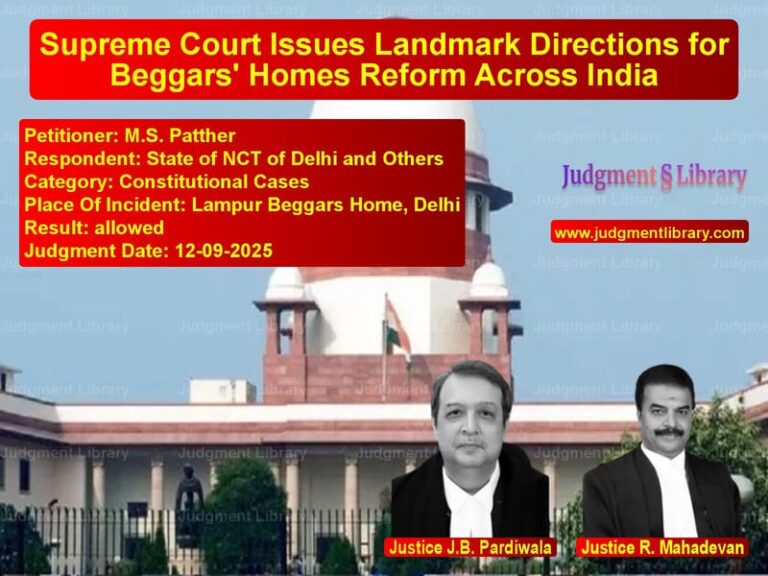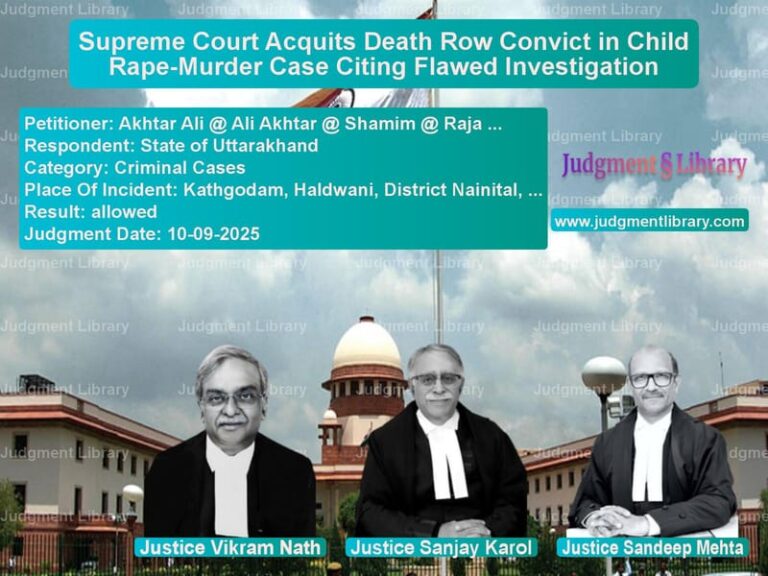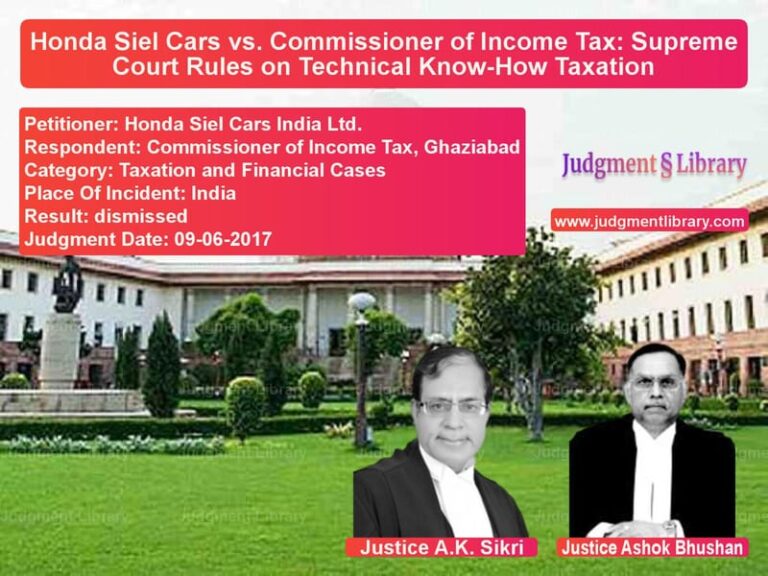Supreme Court Transfers Divorce Case from Rajasthan to Gujarat
The Supreme Court of India, in its judgment dated 22 November 2021, allowed the transfer petition filed by Mamta, the petitioner-wife, seeking the transfer of her pending divorce case from Sirohi, Rajasthan, to Gandhinagar, Gujarat. The case, Mamta vs. Kailash Chand Agrawal, involved a request for the transfer of Divorce Case No. 94 of 2018, filed by the respondent-husband under Section 13 of the Hindu Marriage Act, 1955, on the grounds of inconvenience and hardship faced by the wife.
Background of the Case
The divorce petition was originally filed by the respondent-husband, Kailash Chand Agrawal, in the Court of Additional District Judge, No. 1, Aburoad, Sirohi, Rajasthan. The petitioner-wife, Mamta, contended that she resided in Gandhinagar, Gujarat, which was approximately 237 kilometers away from Sirohi, making it difficult for her to attend court proceedings.
Considering the hardship faced by the wife in traveling such a long distance for court hearings, she approached the Supreme Court under Section 25 of the Code of Civil Procedure, 1908, requesting the transfer of the case to the Additional Civil Judge & JMFC, Gandhinagar, Gujarat.
Read also: https://judgmentlibrary.com/divorce-case-transfer-supreme-court-allows-wifes-plea-for-convenience-2/
Petitioner’s Arguments
The petitioner, Mamta, represented by her legal counsel, made the following arguments:
- She was residing in Gandhinagar, Gujarat, and traveling to Sirohi for court hearings was inconvenient and financially burdensome.
- As a woman, she faced additional difficulties in commuting long distances alone for legal proceedings.
- The respondent-husband had initiated the divorce proceedings in Rajasthan, even though it was difficult for her to contest the case there.
- It was just and appropriate to transfer the case to a court near her place of residence to ensure a fair trial.
Respondent’s Position
Despite being served with a notice of the transfer petition, the respondent-husband, Kailash Chand Agrawal, did not appear before the Supreme Court or file any response. This lack of representation strengthened the petitioner’s case, as there was no opposition to the request for transfer.
Supreme Court’s Observations
The Supreme Court bench, comprising B.V. Nagarathna, reviewed the facts of the case and noted:
- The petitioner’s plea was based on genuine hardship due to the long distance between her residence and the trial court.
- Despite being served notice, the respondent did not contest the transfer petition.
- The petitioner had made a reasonable case for transfer under Section 25 of the CPC.
- To ensure access to justice, matrimonial cases should be heard in locations where the affected party can attend proceedings without undue hardship.
Final Judgment
The Supreme Court ruled in favor of the petitioner-wife, issuing the following directives:
- The divorce case titled “Shri Kailash Chand Agrawal vs. Smt. Mamta” was transferred from the Additional District Judge, No. 1, Aburoad, Sirohi, Rajasthan, to the Additional Civil Judge & JMFC, Gandhinagar, Gujarat.
- The transfer was deemed just and appropriate in light of the petitioner’s circumstances.
- The petition was allowed without imposing any costs on either party.
Implications of the Judgment
This ruling has significant implications for matrimonial disputes and transfer petitions:
- Ensuring Fair Access to Justice: The ruling affirms that courts must consider the convenience and accessibility of the trial venue, especially for women in matrimonial disputes.
- Judicial Precedent for Transfer Petitions: The judgment reinforces that transfer petitions should be granted when a litigant, particularly a woman, faces undue hardship.
- Protection of Women’s Rights: The Supreme Court acknowledges the practical difficulties women face in attending distant court proceedings, ensuring fair participation in legal matters.
- Respondent’s Non-Appearance Considered: The ruling highlights that if a respondent fails to contest a transfer petition, it may be granted in favor of the petitioner.
The Supreme Court’s decision in Mamta vs. Kailash Chand Agrawal sets a precedent for similar cases, ensuring that matrimonial litigants are not disadvantaged due to logistical and financial constraints.
Petitioner Name: Mamta.Respondent Name: Kailash Chand Agrawal.Judgment By: Justice B.V. Nagarathna.Place Of Incident: Sirohi, Rajasthan.Judgment Date: 22-11-2021.
Don’t miss out on the full details! Download the complete judgment in PDF format below and gain valuable insights instantly!
Download Judgment: mamta-vs-kailash-chand-agrawa-supreme-court-of-india-judgment-dated-22-11-2021.pdf
Directly Download Judgment: Directly download this Judgment
See all petitions in Mutual Consent Divorce
See all petitions in Alimony and Maintenance
See all petitions in Child Custody
See all petitions in Judgment by B.V. Nagarathna
See all petitions in allowed
See all petitions in Transferred
See all petitions in supreme court of India judgments November 2021
See all petitions in 2021 judgments
See all posts in Divorce Cases Category
See all allowed petitions in Divorce Cases Category
See all Dismissed petitions in Divorce Cases Category
See all partially allowed petitions in Divorce Cases Category







